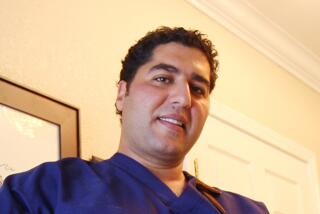Plaintiffs allege ‘gruesome conditions’ at Lap-Band clinics
Workers at weight-loss surgery centers affiliated with the 1-800-GET-THIN ad campaign persuaded patients to have medically unnecessary surgeries and billed insurance companies for procedures that were never performed, a new lawsuit alleges.
Two women who formerly worked at surgery centers associated with the Lap-Band ad campaign also alleged that executives covered up mistakes that contributed to the Sept. 8 death of Paula Rojeski, a Lap-Band patient from Orange County.
The new lawsuit seeks damages from eight people, including brothers Michael and Julian Omidi, who the lawsuit says run the weight-loss business from offices in Beverly Hills. The lawsuit, filed Tuesday in Los Angeles County Superior Court, also seeks damages from 13 companies it says are controlled by the Omidis.
Full coverage: Lap-Band investigation
The Omidis did not immediately respond to a request for comment.
At least five patients have died since 2009 after Lap-Band procedures at clinics in Beverly Hills and West Hills that are affiliated with the 1-800-GET-THIN marketing campaign, according to autopsy reports, lawsuits and other public records.
Manufactured by Irvine-based Allergan Inc., the Lap-Band is a ring that is surgically implanted around the stomach to discourage overeating. The 1-800-GET-THIN marketing company, whose advertising is plastered on freeway billboards throughout Southern California, said in a court filing last year that it scheduled more than 10,000 Lap-Band surgeries in its first 15 months.
Former surgery center workers Dyanne Deuel and Karla Osorio alleged in the lawsuit that they were retaliated against after reporting unsafe and unsanitary conditions at the clinics. They also alleged that a series of missteps contributed to the death of Rojeski after Lap-Band surgery at a clinic in West Hills. Deuel said she was not present during the surgery but learned about the mistakes during discussions with staff members who were.
“What the slick advertising campaign doesn’t disclose are the horrific and gruesome conditions that our clients allege exist at these surgery centers and the fact that patient care is sacrificed for profit,” said Alexander Robertson, the Westlake Village attorney who filed the lawsuit on behalf of Deuel and Osorio.
When the Rojeski surgery started, the machine that was supposed to be providing oxygen to Rojeski was inadvertently turned off, the lawsuit said. During the surgery, the tube delivering pain-killing medications to her bloodstream became dislodged and caused the solution to pool on the ground instead of flowing into Rojeski’s blood, the lawsuit said.
Further, the lawsuit said, the anesthesiologist treating Rojeski, Dr. Deming Chau, mistakenly assumed that a blood-pressure monitor was malfunctioning when it said Rojeski’s blood pressure had slipped to a dangerously low level.
The surgeon, Dr. Julius Gee, stopped the procedure several times and asked the anesthesiologist whether everything was OK because Rojeski was “bucking” on the operating table and alarms on the monitors were sounding, the lawsuit said. Chau told him the monitors were malfunctioning, according to the lawsuit.
Chau could not be reached, and Gee did not immediately respond to a request for comment.
After surgery, Rojeski stopped breathing and did not have a pulse, the lawsuit said. Chau didn’t notify the rest of the staff of Rojeski’s dire condition for 15 minutes, the lawsuit said. When paramedics arrived, they were not told that Rojeski’s pulse had stopped 15 minutes earlier, the lawsuit said. The patient was pronounced dead at a nearby hospital.
After Rojeski’s death, Michael Omidi instructed Chau to change his report to “delete the 15-minute gap” before he told anyone that the woman had stopped breathing and did not have a pulse, the lawsuit said.
Michael Omidi also directed employees to remove “defective equipment” used in Rojeski’s surgery from the West Hills surgery center and replace it with properly functioning equipment from Beverly Hills — before an inspection by Los Angeles County health and coroner’s officials, the lawsuit said.
The coroner’s office has not yet determined the cause of Rojeski’s death, said Ed Winter, Los Angeles County’s assistant chief coroner.
In a separate development, a surgeon who performed procedures at the Beverly Hills and West Hills locations has accused the companies and their operators of insurance fraud. The claim was made in a deposition by Dr. Ihsan Shamaan that was filed Tuesday in Los Angeles County Superior Court in a wrongful-death lawsuit pending against 1-800-GET-THIN, the Omidis and the surgery centers.
The deposition was included in a filing that seeks monetary sanctions from a 1-800-GET-THIN attorney accused of improperly removing Shamaan from an earlier deposition. Shamaan performed surgery on a patient named Laura Faitro, 50, of Simi Valley, who later died.
In his deposition, Shamaan said that at the direction of Julian Omidi he signed hundreds of insurance statements indicating he had diagnosed patients, when he had not done so.
“Is that fraud? Of course it’s fraud. I didn’t see the patient,” Shamaan said in the deposition.
The surgeon also testified that he was approached by the Omidis and their lawyer Brian Oxman and was offered cash if he would sign a fraudulent statement that accused attorney Robertson, who has filed several lawsuits against the Omidis, of ethical violations that were untrue.
The new allegations come one month after the Food and Drug Administration sent 1-800-GET-THIN and affiliated surgery centers a notice that the billboard ads were misleading because they did not include adequate warnings about risks of Lap-Band surgery.
Deuel and Osorio said in their lawsuit that they were retaliated against after complaining about conditions in the surgery centers. Deuel said she worked at the surgery centers as a supervising surgical technician for 10 months until being fired in November. Osorio, who worked as a surgical technician, said she took a leave of absence in December because of a hostile work environment.
Eleven former patients are also named as plaintiffs in the lawsuit. They accused the defendants of influencing them to have medical procedures they did not need or billing their insurers for procedures that were not performed.
The lawsuit said one patient, Elisabeth Johnson, was told she would need to have her gallbladder removed before she could have Lap-Band surgery. The companies billed Johnson’s insurer $52,000 to remove the organ, a procedure that Johnson said was “medically unnecessary.”
Lap-Band patient Darlene Floriano alleged in the lawsuit that the companies fraudulently billed her insurer for a “hernia repair” even though she did not have a hernia.
The lawsuit also alleged that some female patients were given unnecessary hysterectomies as a condition to have Lap-Band surgery, but it did not list any specific examples.
Robertson, Deuel’s attorney, said in an interview that Deuel had provided information about Rojeski’s treatment to the state medical board and Los Angeles County coroner.
Times staff writer W.J. Hennigan contributed to this report.







